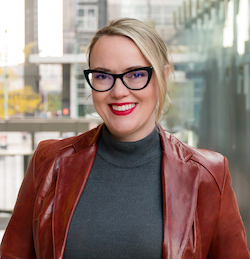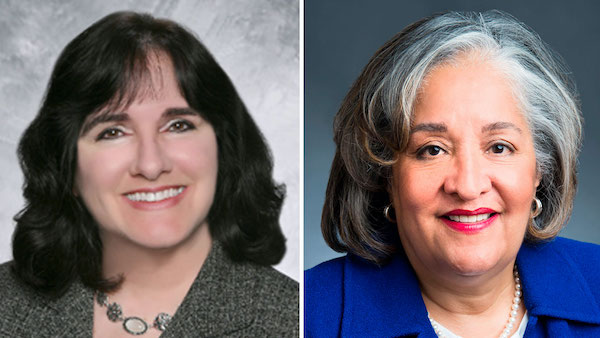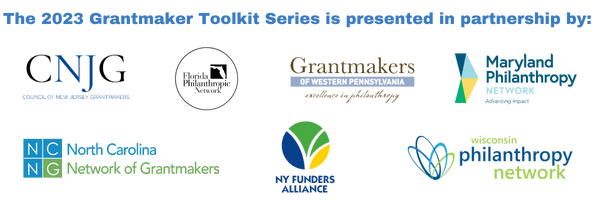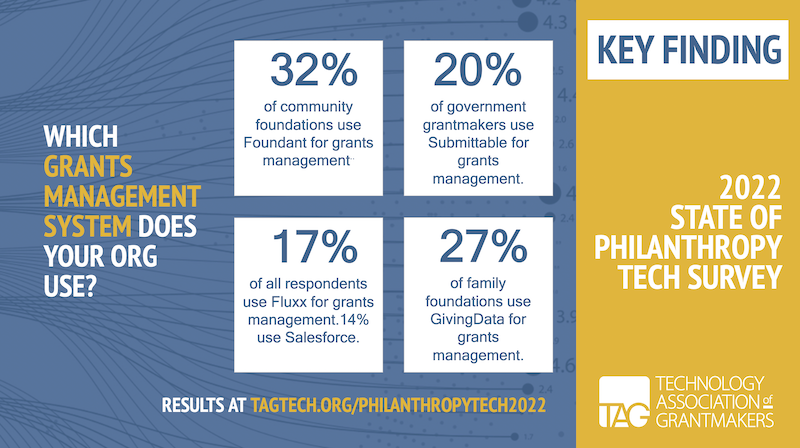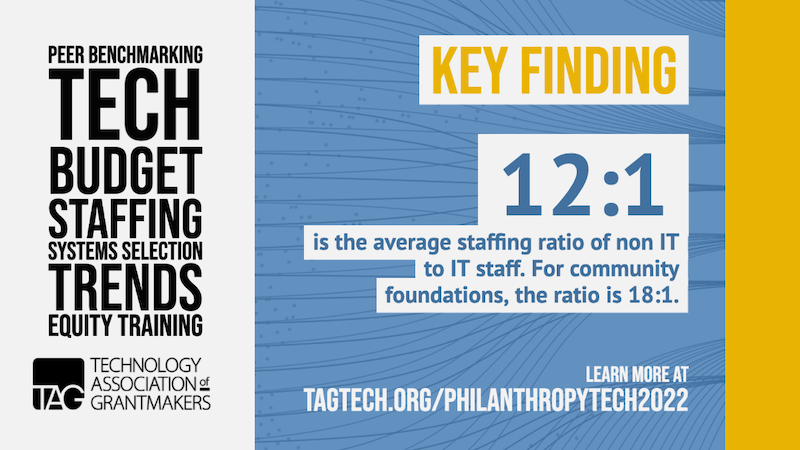Site Search
- resource provided by the Forum Network Knowledgebase.
Search Tip: Search with " " to find exact matches.
You will have an opportunity to learn about the collaborative process that resulted in this first version of the framework. In addition, you will hear from peers and practitioners who contributed to the development of the framework. Don't miss this opportunity to gain a deeper understanding of the framework's design principles and how they foster equity, transparency, and responsible AI adoption.
Speakers
Jean Westrick, Executive Director, TAG
Gozi Egbuonu, Director of Programs, TAG
Who Should Attend
Grantmaking Executives
Philanthropy Tech Professionals
Program Managers
Technology Leaders
AI for Good Enthusiasts and Advocates
COST: Free for CNJG Members and Non Member Grantmakers
Jean Westrick, Executive Director
Technology Association of Grantmakers
Jean Westrick is the Executive Director of the Technology Association of Grantmakers, a nonprofit organization that cultivates the strategic, equitable, and innovative use of technology in philanthropy. Westrick brings two decades of experience building communities, leveraging technology, and leading innovative and programmatic strategies. Prior to being named Executive Director of TAG, Westrick was the Director of IT Strategy and Communications at The Chicago Community Trust where she led change management efforts for the foundation’s $6M digital transformation initiative. Also, while at The Trust, Westrick directed On the Table, an award-winning engagement model designed to inspire resident action that was replicated in 30 cities nationwide. A longtime advocate for equity in STEM education, expanding technology access and increasing science literacy, Westrick holds a Bachelor of Arts from Michigan State University and a Master of Science from DePaul University.
Gozi Egbuonu, Director of Programs
Technology Association of Grantmakers
Gozi Egbuonu is the Director of Programs at the Technology Association of Grantmakers (TAG), a nonprofit organization with a mission to cultivate the strategic, equitable, and innovative use of technology in philanthropy. Prior to TAG, Gozi was an Impact Officer at Network for Good’s (now Bonterra) capacity-building program called Jumpstart. Through her advocacy for philanthropic investments in the technological capacity of talented nonprofit leaders and organizations throughout the United States, Gozi helped generate more than $500,000 in capacity-building funds to help nonprofits become more sustainable. In addition to helping generate lasting impact for nonprofits, Gozi created meaningful content and events aimed at educating philanthropic communities on the power of trust-based partnerships between grantmakers and nonprofits. Committed to using technology to improve lives and advance social change, Gozi is researching the use of medical technology to improve healthcare delivery while earning her doctorate in behavioral health from Cummings Graduate Institute. She also holds a Bachelor of Fine Arts from Washington and Lee University, a Master of Arts from Pepperdine Graduate School of Education and Psychology, and a Master of Science from the University of Rochester School of Medicine and Dentistry.
What are the biggest needs and challenges New Jersey communities face as result of the pandemic?
- It starts with the basics: food and shelter, medical equipment such as masks for long-term care facilities, and digital access for remote education and medical screenings. For many immigrants and the undocumented community, this challenge is even greater.
- Parents of school-age children need support in navigating remote education and childcare challenges -- and balancing them with employment needs.
- People who’ve lost their jobs need to know how to find the right support services, and those services need to be accessible -- no technology or language barriers.
- Schools are having to re-imagine how they can open in the fall – if they can – with appropriate social distancing that requires changes to infrastructure and schedules.
- Organizations need support to retrofit their public spaces so they can serve the public safely.
How is CNJG leading efforts to prepare the philanthropic sector for an effective response?
- CNJG helped create the Disaster Philanthropy Playbook after Superstorm Sandy in 2012 and uses many of the lessons learned then to inform response and recovery plans for COVID.
- Almost immediately, CNJG began providing funder briefings, webinars, and other forms of information to the philanthropic community.
- With our members, CNJG created the COVID-19 Funder Learning Community for the numerous response funds that are serving New Jersey was established to:
- Get timely updates on the latest pandemic developments
- Share information about what services and help are needed most -- and where
- Explore potential strategies for effective grantmaking that matches resources to needs and avoids duplication
- Learn best practices from each other
How is the pandemic affecting New Jersey nonprofits?
- The COVID-19 crisis is having a significant and alarming financial and programmatic impact on the nonprofits relied on to care for those in need. According to the Center for Non-Profits Rapid Response Survey:
- 83% cancelled programs or events and correspondingly lost revenue
- 77% have budgetary implications related to strains on the economy
- 52% have increased demands for services
- 40% experienced a disruption in supplies or services provided by partners
- 37% have an increase in or sustained absences of staff and volunteers
- 31% have had layoffs or furloughs
- Many nonprofits lack the digital infrastructure needed to employees’ and volunteers’ sudden switch to remote work and many volunteers who do important work are no longer available.
How is New Jersey’s philanthropic sector responding to the needs of nonprofits and the people they serve?
- Many funders have streamlined the grantmaking process so nonprofits can either refocus grants or receive new funding expeditiously to provide immediate relief for those facing the most pressing situations.
- Many funders are reducing what they ask of nonprofit partners – for instance postponing reporting requirements, deferring site visits, and eliminating other demands on their time so they can focus efforts during this challenging time.
- Some are providing low- or no-interest loans or outright grants to small businesses and nonprofits to retrofit their facilities to keep essential workers and the people they serve safe.
- Several community foundations and other nonprofits have established NJ COVID-19 relief funds that make it safe and convenient for donors to give, and that direct resources to where they are needed most.
- The sector is committed to grounding its work in the Center for Disaster Philanthropy's key principles of grantmaking:
- Resilience, to improve communities holistically and make them stronger than before a disaster.
- Equity, to take historical injustices into account and inform investments.
- Sustainability, to take into account a long-term view and factor in uncertainty.
- Civic participation that equips and empowers those often left out to influence what happens in their communities.
How is CNJG responding to longstanding equity issues that the pandemic exposes and makes worse?
- Together with the Center for Non-profits in New Jersey, we put out a statement on behalf of the state’s philanthropic and nonprofit sectors, urging everyone to speak out against racism and discrimination in all forms.
- CNJG established a Racial Equity Task Force to eliminate any structural racism in New Jersey’s philanthropic community.
- Most of the larger COVID funds engaged community-based practitioners to assist in decision-making on grant awards, and CNJG is creating a local advisory group for the Learning Community.
What steps are being taken to make sure grants aren’t duplicative and that money is going where it’s needed most?
- CNJG encourages the philanthropic sector to use a shared mapping tool that shows how much money is being awarded and where. This tool helps grantmakers make informed decisions and helps to eliminate gaps in historically under-funded communities.
- The COVID-19 Funder Learning Community is a vehicle for building relationships and sharing information about what each funds is doing to support relief and recovery across the state.
What’s the best way for people to donate money for relief and recovery?
You can find a list of these New Jersey Relief and Recovery funds and their contact info here.
The Trust-Based Philanthropy Project is pleased to announce a six-part webinar series addressing common questions, clarifying misconceptions, and exploring ways to overcome obstacles in implementing trust-based philanthropy. CNJG is pleased to share this opportunity with our members.
Series Description: Trust-based philanthropy is a philosophy and approach rooted in values of relationship-building, mutual learning, and systemic equity – with a vision of advancing a healthier and more impactful nonprofit sector. While this approach is generally associated with six core grantmaking practices such as multi-year unrestricted funding and streamlined paperwork, the day-to-day work of trust-based philanthropy is very nuanced and dynamic. In fact, funders who have embraced this approach are finding that it requires ongoing self-reflection and rigor with regards to how they think about – and evolve – many of the deeply embedded practices and assumptions of traditional philanthropy.
Given these nuances, it is not surprising that there are many questions and occasional misperceptions about what it actually means to embody trust-based philanthropy in practice. In this 6-part webinar series, the Trust-Based Philanthropy Project will explore some of the most commonly asked questions and the underlying misperceptions that may be roadblocks to understanding and operationalizing trust-based philanthropy.
Each session in the series will focus on a frequently asked question from the field, and will feature perspectives from foundation leaders and others who have grappled with similar or related questions. At the end of each session, participants will walk away with: 1) a deeper and more nuanced understanding of the underlying cultural philosophy of trust-based philanthropy; 2) tips for how to think about and approach these nuances in their own work; and 3) talking points for how to answer these FAQs when they come up from colleagues or peers.
Each session will also provide dedicated space for small-group peer dialogue (among CNJG members) about ways to implement these practices into your grantmaking.
Cost: Free
Who should attend: Anyone in a grantmaking role that is curious about understanding the nuances of trust-based philanthropy and how it applies to your work. This series will be ideal for those who have some baseline familiarity with trust-based philanthropy and have questions about how it manifests in practice.
Please note: this webinar series is separate from CNJG’s 2023 Conference for the Social Sector, which features an in-person luncheon keynote by the Trust-Based Philanthropy Project. CNJG’s conference is open to both funders and nonprofits, so the keynote will differ from this series. Because CNJG’s Doing Good Better initiative leans on the principles of Trust-Based Philanthropy, we encourage our members to register for these sessions - as time allows - for funders to learn about different approaches to changing systems in New Jersey.
Demystifying Trust-Based Philanthropy Series Sessions
Session #1: Does Trust-Based Mean Unconditional Trust?
Session #2: Does Unrestricted Funding Automatically Make a Funder Trust-Based?
Session #3: How Do We Approach Risk and Due Diligence in Trust-Based Philanthropy?
Session #4: What Does Grantee Accountability Look Like in Trust-Based Funding?
Session #5: How Do You Measure Impact in Trust-Based Philanthropy?
Session #6: What Does Racial Equity Have To Do With Trust-Based Philanthropy?
Resources
Recording: Session 5: How Do You Measure Impact in Trust-Based Philanthropy?
Transcript: Session 5: How Do You Measure Impact in Trust-Based Philanthropy?
Presentation: Session 5: How Do You Measure Impact in Trust-Based Philanthropy?
Trust-Based Philanthropy Peer Exchange for Grantmakers
The 6 Practices of Trust-Based Philanthropy
Trust-Based Philanthropy in 4D Overview
Trust-Based Philanthropy Story Map
Trust-Based Framework for Learning and Evaluation
Headwaters Foundation Grant Reporting Process
AJWS Accompaniment Model
Satterberg Foundation's Insight Circles Report
Headwaters Foundation Learning Book
AJWS Social Movements Tool
Center for Effective Philanthropy Blog: Rigorous Evaluation Versus Trust-Based Learning: Is This a Valid Dichotomy?
Joint Statement from CNJG and the Center for Non-Profits
This statement also appeared on NJ Spotlight.
A conversation between two customers in line at a New Jersey supermarket turned ugly when one man denigrated the other with a racial slur and blamed the fellow shopper for the coronavirus pandemic.
With so much else going on these days, it would be so easy to react to such a seemingly minor incident by saying, oh well, these things happen. Times are tough; tempers are short.
But shrugging our shoulders is not an option. Doing so is complicity in a wrongful acts that too often are repeated, over and over. Our silence merely emboldens those who would tear apart the fabric of our society, whether through hate or ignorance – or the extremely volatile mix of the two.
It’s not difficult to connect the dots between “little” incidents and the systemic racism that leads to tragedies like the killing of George Floyd in Minneapolis. When we ignore or accept any examples of people being demeaned over what they look like or where they (or their ancestors) came from, we only open the door for massive abuses and the wrenching reckoning that follows them.
We mustn’t be cowed by fear of being seen as overly sensitive or labeled “politically correct.” This is about being morally and ethically correct in the face of bias and hatred – and that shouldn’t be too much to ask of Americans, regardless of their political party or ideology.
As state Attorney General Gurbir Grewal said recently, “COVID-19 is no excuse for racism, xenophobia, or hate. Discrimination and harassment in violation of New Jersey law remains illegal even if it occurs against the backdrop of a global pandemic." It’s gratifying to live in a state where the top law enforcement officer speaks out this way.
Unfortunately, it also is a state where reported hate crimes are up in recent years. We can’t tolerate such behavior, whether by police, elected officials or “average people.” There is too much at stake for bias to become the new normal.
As the leaders of the major philanthropic and non-profit membership organizations in New Jersey, representing both the wide range of non-profit groups and the multi-faceted funders of those groups, we feel compelled to speak out against the hateful responses we and our members have witnessed in reaction to the COVID-19 Pandemic.
Our country has seen countless examples of selfless sacrifice and good works over the past weeks, both on individual and institutional levels. We are proud that the members our organizations have been leaders in responding to the needs of our community.
But to our distress, some individuals are using the pandemic to put forward their bias and hatred toward their fellow citizens.
Times of crisis bring to the surface, on the part of some people, the need to scapegoat. Often, this takes the form of lashing out at particular groups, stirred up by inflamed rhetoric or more subtle code words or phrases, having no relationship to facts. In this time, there have been verbal and physical attacks against people of Asian and Pacific Islander background, as there were against Muslims after September 11 and against African-Americans and Latinos in countless other instances. This hatred and these attacks must stop.
The non-profit sector is the backbone of our communities, providing assistance and education to a wide range of people, in good times and especially in challenging times. Many of these services are a lifeline to people of all backgrounds, religions, ethnicities and statuses in life.
Non-profit organizations are the vehicle through which people can work together to selflessly assist others. People around the world view the United States as being unique in the breadth and depth of its charitable and philanthropic work, engaging the talents of all individuals, regardless of their economic or social status.
We call upon all people of good conscience in their good work to be alert for hateful words and actions and – always -- to speak out against them, both as individuals and as organizations.
Our language and our actions do matter.
Everyone, and especially people in positions of public trust or prominence, has the obligation to use our works and our lives to assist all in need and to honor the dignity and potential of all those we meet.
We call on not only our own members, but everyone who serves and volunteers in our sector to join us in this effort to speak out against racism and hatred and to exemplify all the best that we know our country is.
Maria Vizcarrondo
CNJG CEO and President
Linda Czipo
Center for Non-Profits CEO and President
William V. Engel
CNJG Board Chair
Gina M. Plotino
Center for Non-Profits Board Chair
The New Jersey State Council on the Arts awarded more than $35.6 million in grants to support more than 700 arts organizations, projects, and artists throughout the state. The grants were approved at the Arts Council's 55th Annual Meeting, held virtually. The awards announced today were part of the largest state appropriation the Council has ever received in its 55-year history – $31.9 million as part of the state budget approved by Governor Murphy last month. Today’s grant awards also included $7.5 million in Coronavirus Relief Funds, which were signed into law by Governor Murphy earlier this year as part of a multi-bill package aimed at economic recovery.
Secretary of State Tahesha Way addressed attendees at the meeting, commending their creativity and resiliency during the pandemic. "The innovation New Jersey’s arts community has shown over these last 16 months is absolutely awe-inspiring,” said Secretary Way. “The arts have been a crucial source of healing and connection throughout the pandemic, and I am proud to work closely with the State Arts Council as they lead the field with responsive grants and services so people can continue to enjoy and engage with New Jersey arts.”
According to a collaborative study of the arts sector, led by ArtPride NJ, New Jersey nonprofit arts organizations have lost more than $100 million and counting due to pandemic-related closures, cancellations, and lost contributed and earned revenue. When the arts sector is open and thriving, it generates more than $660 million in economic activity statewide, employs nearly 22,000 workers, and engages more than 8.3 million people who stay in hotels, and eat and shop locally. For more on the important role the arts play in recovery, visit KeepJerseyArtsAlive.org.
“We are grateful to Governor Murphy and the legislature for this monumental increase in funding and for recognizing the need for robust public support of the arts right now,” said Council Chair Elizabeth Mattson. “This funding is not only vital to ensuring the arts can continue to move forward and innovate, but will support important work to foster a more equitable and inclusive arts community. We know there is still much work to be done, and we look forward to working alongside our partners and colleagues in the field as we embark on a new chapter together.”
At the October Grantmakers for Education Annual Conference in Washington, D.C., the Newark Funders Education Committee presented a workshop called “How Not to Read the Prize” to a standing-room-only audience of national, regional, and local foundations.
They did so not to dispute the findings in Dale Russakoff’s book, “The Prize,” but rather to expound upon the progress and challenges that have occurred during the period since Mark Zuckerberg’s $100-million-dollar gift was announced in September 2010 and to paint a fuller, more nuanced picture.
The process of putting together the panel was a learning experience for all of us who participated. It helped us to clarify our own thinking about what the gift enabled Newark to accomplish, how we as local funders have come to work together more effectively, and how we might advise national foundations interested in place-based impact to engage with the community and with local funders.
In September 2010, Mark Zuckerberg announced a $100 million gift, to be matched dollar for dollar, to transform education in Newark in five years. The Foundation for Newark’s Future was created as a local foundation that would manage a then-undetermined portion of the gift.
The Prize, by Dale Russakoff, documents the first five few years of this reform effort. As Russakoff illustrates, there were strong personalities involved in the reform effort who had or have now moved to new positions. Also, this was the donor’s first foray into philanthropy and despite efforts at community engagement, many community leaders and activists felt that district and state leaders and national foundation representatives did not invite or respect authentic community participation in its decisions. The book and subsequent book tour largely focused on these themes.
The narrative in philanthropy is that “this bold effort largely failed.” With the benefit of time, we would write a different narrative: there were missteps along the way, and some philanthropic overreach, but Newark is moving forward, education outcomes are improving, and some of the work that was started because of this initiative has had sustained positive impact. Most importantly, there is a robust education dialogue in the city that has moved from vigorous disagreement to an agreement to collaborate even when we disagree. So, the hashtag for this work seven years on might be: #notfinishedyet or #needapart2.
Learn how you can register for events online, search the member directory for organizations and colleagues who have the same interests, and update your profile.
"What is the ongoing impact of social change on grantmaker support for grantees? How common is it for foundation staff to be back in the office? How can I leverage peer benchmarking to advocate for change within my organization?”
In July 2022, Technology Association of Grantmakers (TAG) conducted a survey to better understand the technology environment, practices, and perceptions in philanthropy. Now in its third version, the 2022 State of Philanthropy Tech survey compiled results from 277 grantmaking organizations throughout North America, the EU, and UK. The findings are fascinating!
Topics covered include:
· Technology budgeting and staffing
· Staff turnover and retention
· Remote, hybrid, and in-person work trends
· Cybersecurity breaches, training, and protections
· Trends in tool selection for grants management, remote work enablement, and more
Join TAG executive Director, Chantal Foster, and TAG Survey Committee Member, Tess Hanrahan of the Hewlett Foundation, for this interactive webinar that will explore key findings and trends just in time for your 2023 planning. TAG cultivates the strategic, equitable, and innovative use of technology in philanthropy. Their work builds knowledge, strengthens networks, and advances the social sector.
This program is for members of the following philanthropy-serving organizations: Maryland Philanthropy Network, Council of New Jersey Grantmakers, Florida Philanthropic Network, Grantmakers of Western Pennsylvania, Philanthropy Wisconsin, NY Funders Alliance, and North Carolina Grantmakers.
Webinar Recording
TAG’s State of Philanthropy Tech Survey Presentation Slides (and attached)
2022 State of Philanthropy Tech Survey
6 Tech Trends to Watch in Philanthropy
Selecting Systems for Community Foundations
Favorite Productivity Apps of Webinar Participants: Asana, Microsoft Planner, Calendly, Slack, Evernote, iCalender, Google Calendar, Doodle, DownDetector, Trello, Outlook, Monday.com, Microsoft Bookings, Docusign, OneNote

